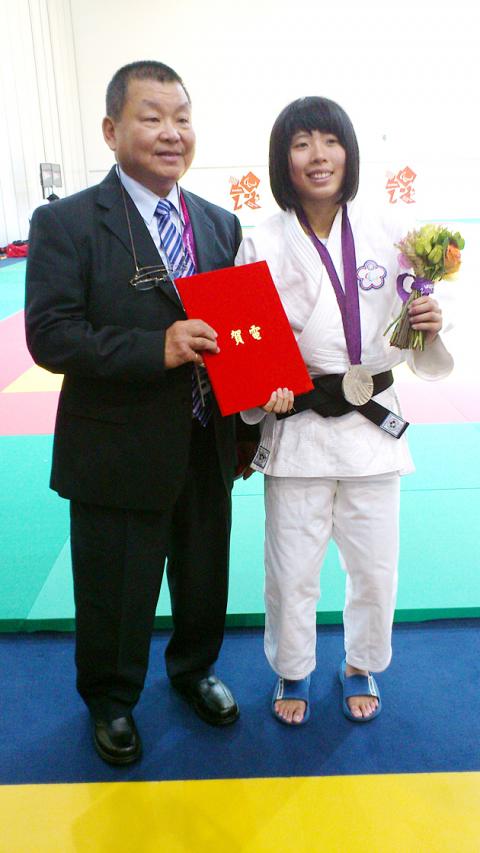Taiwanese judoka Lee Kai-lin (李凱琳) won Taiwan’s first medal at the London Paralympics on Thursday by reaching the final of the women’s under-48kg weight class.
The visually impaired Lee, who is currently ranked No. 1 in the world in her weight division, won silver after losing to Carmen Brussig of Germany in the event’s gold-medal bout.
The 35-year-old Brussig scored a waza-ari against her Taiwanese opponent, who was only able to manage a yuko.

Photo: CNA
In judo, an ippon is the highest score given for a throw or pin and it immediately ends a match. A waza-ari is the second highest score in the three-tier scoring system and it trumps a yuko, no matter how many are scored.
During their previous encounter at the International Blind Sport Federation (IBSA) world championships in Turkey last year, Lee defeated Brussig to win gold.
In her Paralympics debut this year, the 20-year-old Lee frustrated Solene Laclau of France to advance to the semi-finals and then moved on to the gold medal encounter by defeating 30-year-old Karla Ferreira Cardoso of Brazil by two yuko to one.
President Ma Ying-jeou (馬英九), Vice President Wu Den-yih (吳敦義), Premier Sean Chen (陳冲) and Sports Affairs Council Minister Tai Hsia-ling (戴遐齡) sent congratulatory messages to Lee shortly after her success.
Lee, who suffers from congenital optic nerve atrophy and has very weak vision, took up judo when she was in second grade at school.
She said her grandfather started the family tradition of learning judo because many family members suffered from the eye disease and he thought mastering judo could be a way for them to protect themselves.
In high school, Lee’s coach refused to give her “special treatment” and made her train with other athletes who were not visually impaired.
That method toughened her and played a role in helping her win the gold medal at the IBSA judo world championships in Turkey in 2010.

CHAOS: Iranians took to the streets playing celebratory music after reports of Khamenei’s death on Saturday, while mourners also gathered in Tehran yesterday Iranian Supreme Leader Ayatollah Ali Khamenei was killed in a major attack on Iran launched by Israel and the US, throwing the future of the Islamic republic into doubt and raising the risk of regional instability. Iranian state television and the state-run IRNA news agency announced the 86-year-old’s death early yesterday. US President Donald Trump said it gave Iranians their “greatest chance” to “take back” their country. The announcements came after a joint US and Israeli aerial bombardment that targeted Iranian military and governmental sites. Trump said the “heavy and pinpoint bombing” would continue through the week or as long

TRUST: The KMT said it respected the US’ timing and considerations, and hoped it would continue to honor its commitments to helping Taiwan bolster its defenses and deterrence US President Donald Trump is delaying a multibillion-dollar arms sale to Taiwan to ensure his visit to Beijing is successful, a New York Times report said. The weapons sales package has stalled in the US Department of State, the report said, citing US officials it did not identify. The White House has told agencies not to push forward ahead of Trump’s meeting with Chinese President Xi Jinping (習近平), it said. The two last month held a phone call to discuss trade and geopolitical flashpoints ahead of the summit. Xi raised the Taiwan issue and urged the US to handle arms sales to

BIG SPENDERS: Foreign investors bought the most Taiwan equities since 2005, signaling confidence that an AI boom would continue to benefit chipmakers Taiwan Semiconductor Manufacturing Co’s (TSMC, 台積電) market capitalization swelled to US$2 trillion for the first time following a 4.25 percent rally in its American depositary receipts (ADR) overnight, putting the world’s biggest contract chipmaker sixth on the list of the world’s biggest companies by market capitalization, just behind Amazon.com Inc. The site CompaniesMarketcap.com ranked TSMC ahead of Saudi Aramco and Meta Platforms Inc. The Taiwanese company’s ADRs on Tuesday surged to US$385.75 on the New York Stock Exchange, as strong demand for artificial intelligence (AI) applications led to chip supply constraints and boost revenue growth to record-breaking levels. Each TSMC ADR represents

State-run CPC Corp, Taiwan (CPC, 台灣中油) yesterday said that it had confirmed on Saturday night with its liquefied natural gas (LNG) and crude oil suppliers that shipments are proceeding as scheduled and that domestic supplies remain unaffected. The CPC yesterday announced the gasoline and diesel prices will rise by NT$0.2 and NT$0.4 per liter, respectively, starting Monday, citing Middle East tensions and blizzards in the eastern United States. CPC also iterated it has been reducing the proportion of crude oil imports from the Middle East and diversifying its supply sources in the past few years in response to geopolitical risks, expanding